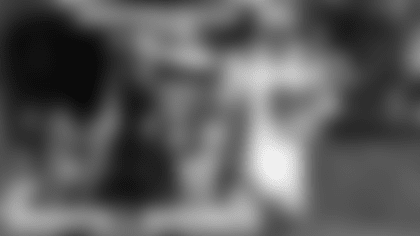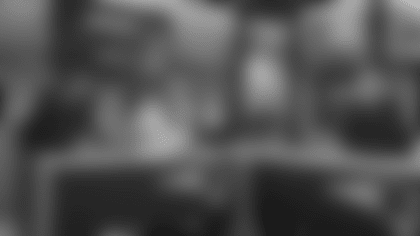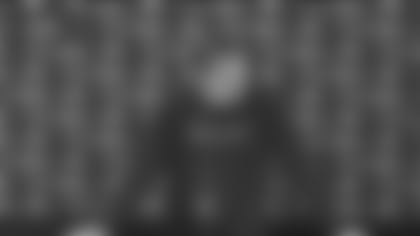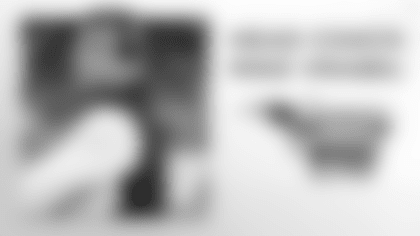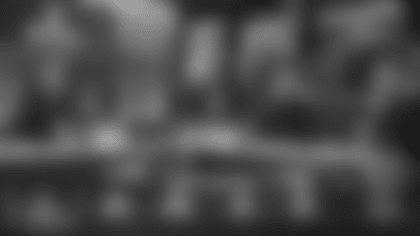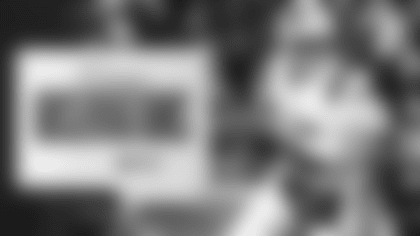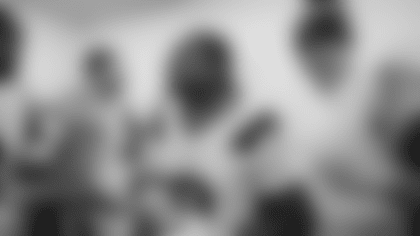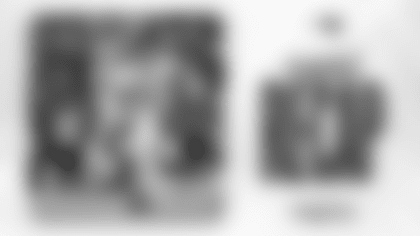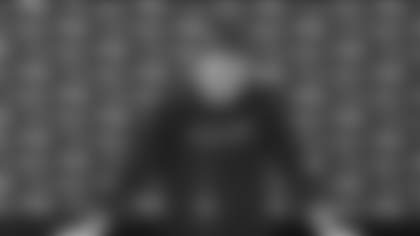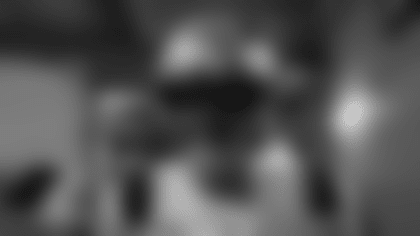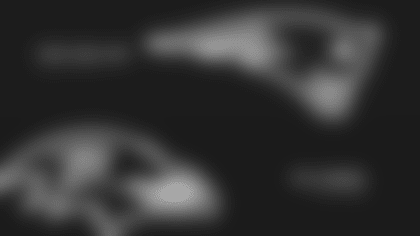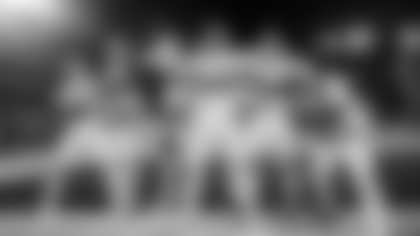[

]()
**B:** We will be in the bubble today, we'll take advantage of our first class facility.
Q: Why are you going in the bubble?
B: To try to keep from slipping and sliding out there.
Q: What is the weather for Chicago?
B: It sounds like there are some snow showers that are moving in, they might be there by Sunday, they might not you know how that goes. It is probably going to get there either Saturday or Monday. At this time of year I don't think it really matters what the forecast is it changes so quickly anyway. We were out in it yesterday. It was cold, we dealt with the wind. We went in both directions and kicked the ball and all of those situations that would normally come up in those types of conditions pretty much came up. The ground was frozen, players having to play with a narrower base with both feet under them and not being able to extend as much on any kind of cuts, that type of thing, that's the way it was out there yesterday.
Q: Playing in the snow would give you that kind of feel, if there is a snow shower why not practice outside today to get them used to that specifically?
B: Yes well we could and just go out there and slip and slide around and don't get much time in and lose the aspect of the timing for the game if it is a little better than that.
Q: More than getting into the conditions?
B: Well again we did it yesterday so the ground…
Q: But it wasn't snowing?
B: No but the ground was frozen, I mean it was similar, it's not the same, it's was similar. We practiced in the rain a couple of weeks ago. Yes I mean there is an advantage to doing it either way and I just feel like we got a good day out there in the elements yesterday. What we really don't want to do is to have our timing be so far off going into the game that if we have a chance to execute things but we just haven't had a good timing day to do it.
Q: Grant Williams, is he still hurt?
B: No I think he has come back and he will be the swing guy.
Q: Are you surprised that you have been able to pick off (Curtis) Jackson and (Jermaine) Wiggins, two quality players at this stage of the game?
B: A little bit, a little bit. Wiggins was waived so there was an opportunity to claim him like with (Marc) Megna and Jackson was on the practice squad like (Grey) Ruegamer and those are always a little bit tougher to do. For example the first time we tried to get Megna Cincinnati matched it. They sold him a pitch that was better then we could sell him so he stayed there, but when the guy is on waivers and you claim him then that it is you get him.
Q: Do you always look to the practice squads of the really good teams like St. Louis?
B: No we look at everybody. We go through everybody's. Every single week we talk about what we call our street list which is all of the players out there who are not with any team, for example Raymont Harris last week he didn't belong to anybody and the practice squad list those players are all with teams, but you can still get them but it is not like talking to a guy who is not connected to any team at all. Street and practice squad, you can bring street people in and work them out and give them a physical and all of that type of thing. The practice squad guys you either have to sign them and then if you sign a practice squad player you also have to keep them on your roster for three weeks, if you sign somebody else's not your own. So if you sign somebody else's you are committed to them for three weeks whereas if you sign a player off the street like Raymont or like with (Maugaula) Tuitele who was our practice squad player, there is no commitment to them. So you just have to decide, weigh it out, but we talk about that every week and then it changes particularly this time of year because guys get picked off or maybe somebody will go on the street list who cleared waivers like Dallas waived Chris Warren, a running back. So this week he appears on that list whereas in previous weeks he didn't. So it changes a little bit each week. We go through and see what the changes have been and kind remind ourselves. There are certain guys that are sort of in your sights, like what would happen if we lost a player at this position, who would be the next guys. You list those guys and then if they get picked off then you scratch them and if somebody else becomes available you add them to it, but it is a weekly process. It doesn't exclude anybody.
Q: But I mean you have taken two Rams receivers, they are obviously are very deep at receiver they have a couple of guys who are at the end of their roster who might be decent players, but can't make their own team do you ever see it that way?
B: Sure I mean anytime you see a team that has a lot of depth at one position you would have a tendency to keep a little bit of an eye on people at that position, but all I am saying is that we look at the receivers on every team not just the Ram receivers or any other position. Each guy has got their own little package, each one is a little bit different and you just try to decide which one fits better for you.
Q: After the season in regards to the draft, how far along are you there and is Scott Pioli going to be involved in the draft or is he more of a free agent acquisition type guy?
B: Scott will probably have some participation in the draft. He did that last year, he saw a few players last year.
Q: But is he more responsible for veteran players and free agents?
B: Yes.
Q: Where do you go for the draft Larry Cook?
B: Yes well of course all of our scouts are out there going to the colleges now. Basically all of the college seasons are over so we are in the process of pulling all of that information together and then getting ready to go to all of the bowl games. Now I think next week, I want to say next week, but I am not sure, but I think it is next week they have the national meetings and then the national guys give all of their stuff on the college players. Then you head into the bowl games, both the all-star games and the orange bowl, the fiesta bowl and all of that. So really what you are trying to do now is pull everything back together and then take your scouts and send certain scouts to certain bowl games and now rather than covering an area of the country, like one guys has the southeast, now you do it more by positions. So, 'You take the linebackers, you take the tight ends, you take the wide receivers' and that kind of thing. Really that is Larry (Cook) and Lionel (Vital) because they are the ones who have been out and they really have seen most all of the players versus a scout who is just doing the Midwest or whatever it happens to be. They have got a bigger cross-section and then they themselves start cross-checking the players they haven't seen.
Q: Will you bring them (scouts) all back here in January?
B: You know January is not really the good time to do it because there is still too much going on. In other words the Blue-Gray game is at Christmas and then you have all of the college bowl games right around the end of December the first of the year. Then there are about five or six all-star games, there is the East-West Game, the Hula Bowl, the Senior Bowl, there is an all-star classic in Florida, I think it is the snow bowl, whatever they all are there is about five or six of them and that pretty much goes through that third week in January, whenever the Senior Bowl is over that is the last one. Whenever that one is over then you try to get your scouts again to reorganize all of that bowl information. You know see a guy from Kent State and Arizona State and then they are both in the Hula Bowl and now you can start to compare them a little bit. You get to that point and then try to prepare that prior to going to Indianapolis. So you take all of the college regular season stuff and you try to organize that in December and then you go out and do all of the bowl games and the all-star games come back and reorganize that at the end of January and then get ready to go to Indianapolis with an idea of pretty much of maybe who your top 200 are, your top fifteen at each position or however it works out. Then once you hit Indianapolis then it is all the individual player workouts because so many guys aren't working out at Indy then you are back out on the road again doing North Carolina or Texas A&M or wherever the workouts are.
Q: How many of those do you attend?
B: I didn't attend any last year.
Q: How about this year?
B: I don't know we'll see.
Q: Did you go to Indy last year?
B: Did I, yes.
Q: Is that something for sure you will go to?
B: I don't plan on going to any of the all-star games. I probably would go to Indy, I doubt that I would be there the whole time. It's just that I don't think Indy is as productive as it used to be. So many players don't work out, I mean it's a zoo. What is was five years ago, ten years ago it has totally changed. I mean it is okay and you get physicals on all of the players, but the rest of it the interviewing and all of that isn't any where close to what it use to be. So many players don't work out. So many of them have gone and the ones that do work out go from, the college season is over for a lot of guys right now the teams that aren't in the bowl games they are now on a workout program from the end of November until the middle of February on vertical jump, broad jump, and toe touch and stuff like that. So when they test, those test results in a lot of cases are really inflated to the specific test like the quickness drill, you know the twenty yard change of direction drill and some of those guys will be doing that for two and a half months. So I think how meaningful some of those tests are, there are a bunch of them that don't do them and the ones that do have been training on a twenty-yard change of direction drill for two months.
[

]()
**Q: So you are more apt to look at production from the players during their seasons than those things?**
B: Right, you look at their overall production, you look at obviously their physical results if there are any physical problems knee injuries or shoulder injuries or whatever it is and then take a look at them on the hoof. I mean it is subjective, but just try to do the best you can on evaluating a guy's athletic ability because the whole thing now, the guys that don't workout at Indianapolis what most of them do is they bulk up. They get their weight up, they get their bench press up, they get all of their strength numbers up so they come in there and they are 6'5", 320 (pounds) and all of that and they bench press as much as they can lift and then the day that Indy is over then they start cutting weight and then they go run. They run three or four weeks later and they run faster than they would at that weight and that strength so now they are 6'5", 305 (pounds) instead of 320 (pounds) and their times are better and their strength is down because they are not lifting because they are training to run. So you come back in April and you have a guy that the height is the same, but you have a guy that has got a big weight and he has a fast time because he didn't want to weigh in because he already weighed in back at Indy. Then when you get the guy there at mini camp you find out that either you have a big guy who doesn't run as well or you have a littler guy who is not as strong. The agents know the game and that is the routine. I think it becomes a lot more subjective and the scouting is becoming more and more important because the things that use to be pretty equal really aren't any more.
Q: Do you ask your scouts to find obscure guys like (Wayne) Chrebet, (Ben) Coates or Chad Eaton or does that just happen by accident?
B: No I don't think it is an accident at all. I mean yes we try to scout every player that we think is a legitimate NFL prospect, but then it becomes the evaluator. I can't even tell you how many guys there are, I want to say 5,000 names, college seniors or draft eligible, it's maybe 5,000 something like that, I mean it is a lot. So you know you can't scout 5,000 guys.
Q: Do you have faith in these scouts based on this teams record in the draft these last couple of years?
B: I wasn't here I can't really comment on what was or wasn't done. All I know is that we want to try to get a system in place that is going to give us every advantage we can in finding players, both college and pro, or Canada, or Afghanistan or wherever they play. That's our job, to find good players and then coach them and get them to play well as a team. So wherever they are then we have got to look at them. We can't control the other places that they are at all we can do is evaluate them, so that's what we try to do. Larry (Cook) is very well organized, he has been as the business a longtime and Lionel (Vital) has as well. I have worked with Lionel for a number of years and the people that work under them they are going to have to work with and make everything consistent and have continuity so that it is meaningful. You try to get everybody on the same grading scale, that's really the hardest part of scouting, it's just like when you are in school some teachers grade harder than others and you want a B to be a B to be a B, but in some cases and grading football players is the same kind of thing. One guy gives him a B, another guy gives him a B and then if we both look at the player than we can see that they are not equal, that there is a difference there and you have got to try to even that out, that's what good scouting systems does. What you need is a system that kind of forces that to happen so that even though you may want to give the guy a C and I may want to give him an A, the system kind of makes us put him at point that's wherever he fits is the right point.
Q: You mentioned Afghanistan, do you have contacts in like Australia for the Rugby League, guys that could translate into the NFL?
B: Actually we have a couple of good contacts in Australia. I don't know how beneficial those will be, but since you mentioned Australia. Actually Eric Mangini coached in Australia.
Q: Aussie Rules?
B: I can't tell you how many highlight tapes we have watched of Australian Football players, none of whom are playing in this league, but they are pretty damn good in their league. They are the Wayne Gretzky's of Australian Football, but I can't say we have had any production, but we have scouted them…
Q: Nobody has ever caught your eye?
B: Well (Darren) Bennett the punter, but we are going back a few years, but I am saying in the last four or five years we have worked a couple of guys out and they can kick the ball, but it is the same deal you have so far to go with them. I mean the guy is so raw. His technique is so much different because of the way the game is played. First of all you have to teach him to change his technique, the ball is a little bit different and then you have to put him in game conditions and all of that. I mean when is he going to be ready it could be two or three years and it is just hard to commit that kind of time to…
Q: They are tough though, tough guys.
B: Yes I mean there are some good athletes down there, yes there are some real impressive athletes, but it is a different game and a lot of those guys are older too. By the time they are what they are 26, 27, 28 and it is hard to start training at that point.
Q: How about the WWF, like the Rock?
B: But those people are under contract so we can't talk to them. Sergeant Slaughter was always my favorite he had the best thing going.
Q: Wouldn't it be good if the guys from Chicago were watching this on the Internet right now.
B: You weren't here last week, it was Saturday instead of Friday there was a small crowd. I mean we are packed compared to last Saturday.




